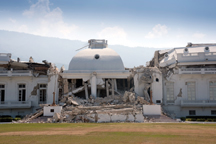
ASTM Joins in Congressional Briefing
Coalition Organizes Meeting to Provide Better Understanding of Earthquake Devastation
ASTM International joined with 23 organizations, including the American Institute of Architects, the International Code Council, the American Society of Civil Engineers and the National Electrical Manufacturers Association to conduct a briefing for the U.S. Congress on rebuilding in the wake of an earthquake. The Feb. 4 program, "After the Earthquake: The Role of Building and Infrastructure in Mitigating Disaster," was organized by the High-Performance Building Congressional Caucus Coalition to provide Congressional staff with a better understanding of the devastation brought on by earthquakes and how the U.S. building community can help Haiti and other nations construct safer buildings and infrastructure.
Statistics from Haiti following the earthquake are staggering: 20,000 commercial buildings collapsed, 225,000 residential buildings beyond repair, and 180 government buildings destroyed. According to Anne Kiremidjian, Ph.D., of the Stanford University School of Engineering, the tallest building in Haiti still stands because it was built to modern building codes similar to those required by many U.S. cities.
The destruction of buildings in Haiti was also attributed to poor quality of materials such as concrete and wood, and poor design and construction techniques. There is also growing concern that debris from the destruction will be used to rebuild substandard housing to serve as shelter in the coming weeks.
Haiti does not have a national building code nor the necessary enforcement mechanism required for constructing and maintaining structures. Along with many other Caribbean islands, Haiti faces risk annually from hurricanes and earthquakes, and for this reason buildings have to be designed to withstand the effects of these two potential natural disasters. The Caribbean Uniform Building Code was developed to serve as a regional consensus on appropriate building standards for the Caribbean region to harness the expertise of many countries that develop codes.
Although the destruction is great, speakers at the briefing suggested that Haiti presents an opportunity to rebuild, not only better but greener, if focusing on the environment and sustainable practices is factored into the rebuilding equation.
The briefing highlighted a need to work with the Haitian community by creating partnerships to help them rebuild through education and exchange programs and training experts on building codes, standards for materials and regulatory requirements. Many of the co-sponsors of the briefing reached out several years ago to support a bill sponsored by Senator Christopher Dodd (D-CT) and Representative Rosa DeLauro (D-CT) entitled the Codes and Safety for the Americas Act, which would translate code books and offer training to experts in the designated country. The bill was passed and signed into law by former President George W. Bush, though funding was not appropriated to support the efforts.
The catastrophic magnitude 7.0 earthquake that occurred in Haiti on Jan. 12 affected an estimated three million people, with hundreds of thousands among the dead and injured. In addition, thousands of commercial and residential buildings were destroyed, leaving many people homeless. Joining the worldwide wave of humanitarian aid that followed the earthquake, ASTM International has made a $10,000 donation to the American Red Cross to continue relief efforts in Haiti.
 SN Home
SN Home Archive
Archive Advertisers
Advertisers Masthead
Masthead RateCard
RateCard Subscribe
Subscribe Email Editor
Email Editor